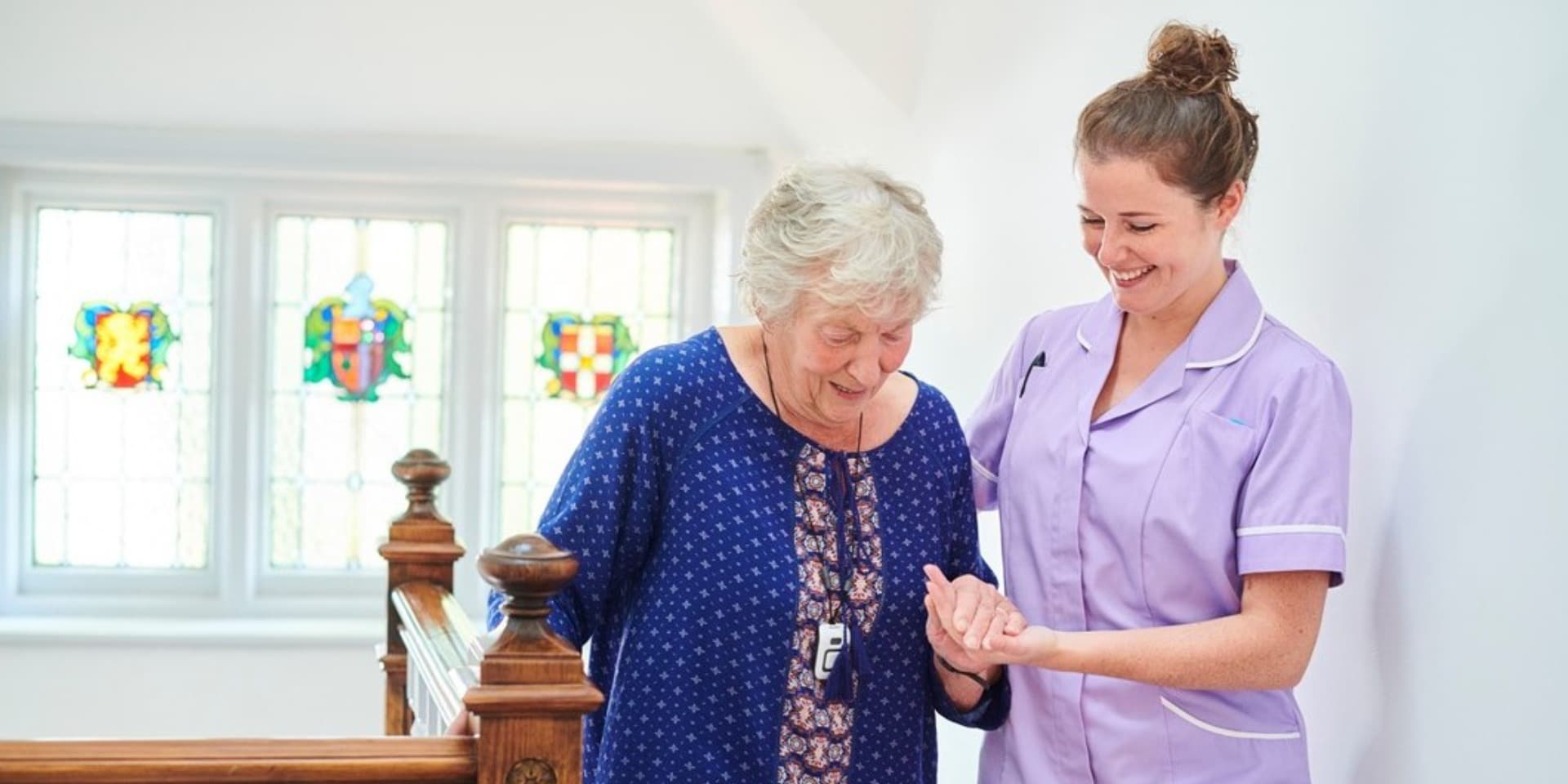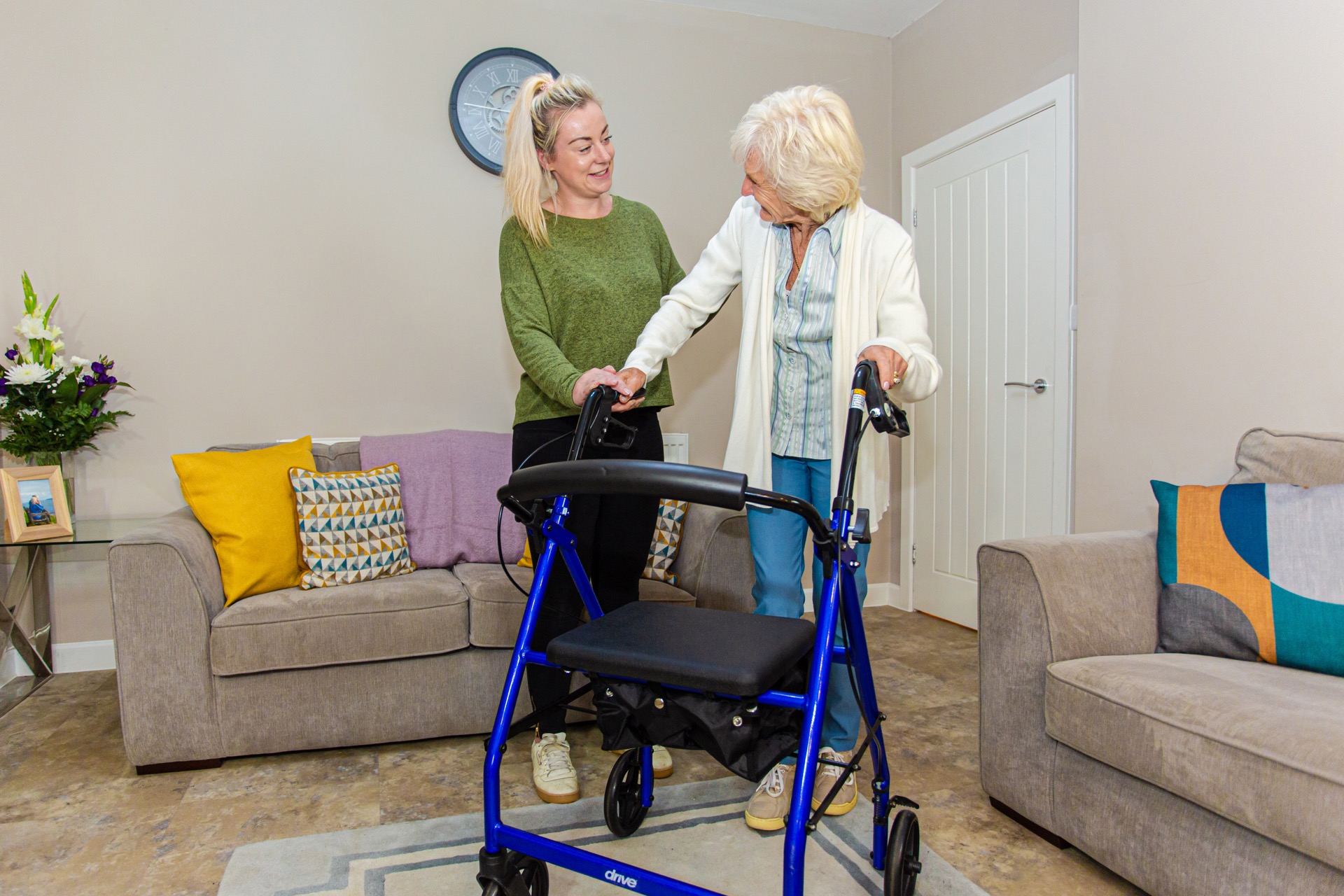Domiciliary care
What is domiciliary care?
Domiciliary care is a range of services put in place to support someone in their own home.
Domiciliary carers, also known as home carers or private carers, are professionals who help people live independently in their own homes through daily visits or live in care. Their role is focused on assisting with household tasks, medication, and other activities that help to maintain quality of life.
It is available to those who need another pair of hands to help with day to day household tasks, personal care or any other activity that allows them to maintain their quality of life and independent living.


Why opt for domiciliary care?
Many families are opting for domiciliary care – otherwise known as care at home – because it puts them back in control of the support they receive. Domiciliary care allows you to remain in the home that you love and continue living life on your own terms, safe in the knowledge that you’ve got private carers providing you with all the care and support that you require.
We provide consistency of care
Personalised support
Domiciliary care allows you to enjoy a personalised care plan that ensures you’re always getting the right support for your needs and wishes
A holistic approach
Our holistic approach means no stone is left unturned in your care plan, so you’ll get the emotional, practical and physical support you need
Stay in a familiar environment
Many people relish the chance to remain in the comfortable, secure surroundings of home whilst receiving the additional support they need
Spend more time with loved ones
You’ll be able to choose when your family and friends visit, and your carer can assist with hosting duties – including getting your home spick and span
One-to-one care
Care at home gives you the opportunity to receive personal one-to-one support from your own carer, meaning you’ll always have their full attention
Maintain your routines and hobbies
Domiciliary care allows you to continue living life on your own terms, which includes keeping up all your favourite hobbies, routines and activities
Quality care in your home from Helping Hands
We provide ongoing support that’s completely built around your needs and routines.
Our bespoke care plans are one of the many reasons why we’re the nation’s favourite for home care.
With one-to-one personal attention, from 30 minutes a week and up to several visits a day or overnight support, our visiting care plans are completely built around you. You can even opt to have a live-in carer living with you at home to provide 24-hour care.



Who is domiciliary care for?
Domiciliary care is for anyone who wants to stay at home to receive the support they need.
Domiciliary care can be beneficial to people of all ages and with a wide range of circumstances and conditions. A “one-size-fits-all” approach doesn’t work for domiciliary care, because every individual person has their own unique set of support needs, so there really isn’t a particular type of person for whom it is or isn’t suitable.
At Helping Hands, our carers are expertly trained to provide a wide range of bespoke care services to people with varying levels of needs – no matter how straightforward or complex they may be.

What does a domiciliary care worker do for you?
-
See what this means for youWe are a fully regulated serviceClosely monitored by an external regulatory bodyAt Helping Hands our care is fully-regulated
Independent inspections
Audits conducted by a regulatory body to give you peace of mind that we do what we say we will do.
Fully vetted and approved carers
Our carers are vetted and checked through a robust recruitment process which complies with the regulations.
Comply with regulatory standards
We have to comply with regulatory standards to maintain our registration, meaning our customers are reassured that they are receiving a high standard of care.
Standardised training across the company
Training for all carers and staff is in line with the Care Certificate, meaning our employees are trained to a nationally-recognised standard before they work unsupervised with our customers, providing a safe and responsive service.
Helping HandsUn-regulatedOur domiciliary care services
We offer domiciliary care on both a visiting care and live-in care basis to suit your personal needs and preferences.
 Visiting care
Visiting careWith visiting care, we’ll visit you as little or as often as you wish throughout the week to ensure you’re given the support you need to help manage your condition.
Learn moreVisits from 30 minutes a week
- With care visits starting from as little as 30 minutes per week, your visiting care can be planned around your routines and schedules
Flexible support
- Visiting care allows you to benefit from having a type and level of support that is fully tailored to your specific needs and wishes
Condition-led care
- Your visiting carer will proactively help you to manage the symptoms of your condition
 Live-in care
Live-in careLive-in care places a specially trained live-in carer in you or your loved one’s home to provide personalised care every day, offering constant support around the clock.
Learn more24-hour care
- With a live-in carer, you will benefit from the round-the-clock support and companionship offered by having a carer in your home
Life on your own terms
- A live-in carer will enable you to get the most out of life and continue doing the things you really enjoy
Handpicked carer
- We know that having a carer move into your home is a big step for you to take, which is why we'll help you find someone who shares your interests and personality

How can our domiciliary carers support you?
Our wonderful carers are fully trained to provide person-centred home care services.
Our fully-trained carers can help to keep you living independently in your own home through daily visits or live-in care. Their role is fully focused on you and your needs, helping you to maintain quality of life and independence through the following:
Personal care
Your domiciliary carer can provide discreet and dignified personal care with routines such as bathing, toileting and getting dressed
Household tasks
Your carer can help around your home with housekeeping tasks such as cleaning and vacuuming, doing the laundry, and doing the bins
Mobility support at home
Every Helping Hands carer is trained in mobility support, so they can help with things like getting in and out of bed and moving around the home
Light medical support
Our fully trained carers can provide medical support including catheter care, PEG feeding and suppositories, to name just a few
Friendly companionship
All of our carers have been handpicked for their kind, compassionate personalities, which means they also provide wonderful companionship
Getting out and about
Whether you want to visit family, pop to the shops or go away on holiday, a carer can help you plan your travel and accompany you along the way

 The staff are keen to do whatever is required to make your life easier. They are friendly and chatty whilst getting on with the task in hand so that you have full benefit. Highly recommended.Helen A Trustpilot review
The staff are keen to do whatever is required to make your life easier. They are friendly and chatty whilst getting on with the task in hand so that you have full benefit. Highly recommended.Helen A Trustpilot reviewWhy choose domiciliary care over a care home?
At Helping Hands, the reason we’re home care specialists is because we passionately believe that home is the best place in which to receive care. There are numerous advantages to care at home over residential care, such as:
Helping Hands Helping Hands careResidential care Residential careYou can remain in the comfort of your own homeYou have full control over your meal times and preferencesOne-to-one, 24-hour care from your own dedicated carerYou can continue with your preferred lifestyle and routinesYour friends and family can visit as much as they likeCall us to find out more about domiciliary care
Domiciliary care for the elderly
Domiciliary care is perfect for elderly people not wishing to avoid the stress of moving.
If you or an elderly loved one are reaching the stage of life where you’d benefit from a bit of extra support but you don’t wish to sacrifice your independence and your home comforts, domiciliary care could be perfect for you. Our carers can help you to live with age-related frailties and provide fully tailored elderly support around the home, allowing you to continue living your best life.
Fully regulated by the CQC / CIW
All of our domiciliary care services are fully managed and regulated by the Care Quality Commission (CQC).
From your very first phone call to our friendly team, every aspect of your home care service is independently monitored and regulated by the CQC and Care Inspectorate Wales (CIW).
Why is being a regulated company important?
What is a regulated care service?
A regulated care service is fully monitored and assessed by independent regulatory bodies
Why are we regulated?
We choose to be regulated so every customer can have full reassurance when receiving care from us
How does regulation affect my care?
Regulation guarantees that your care, and the carer providing it, meets industry standards and
Domiciliary care FAQs
-
What does domiciliary care mean?
-
Domiciliary care is a term commonly used to define the range of services put in place to support an individual in their own home.
-
What are the advantages of domiciliary care?
-
The biggest advantage of domiciliary care is that it allows your or your loved one to retain their independence in the home they know and love.
-
Who pays for domiciliary care?
-
Your local authority might be able to pay some or all the costs associated with domiciliary care. However, you may have to pay for all the services yourself. Make sure you claim all the benefits you’re entitled to – Attendance Allowance and Disability Living Allowance (or Personal Independence Payment) are among the most common.
-
Is domiciliary care cost effective?
-
Domiciliary care can be a cost effective alternative to residential care, especially for a couple or for people who have domiciliary care on a visiting basis.
-
What are the differences between domiciliary care and residential care?
-
Domiciliary care services are provided in an individual’s own home, whereas residential care involves the person moving permanently into a specialist supervised establishment set up solely to provide care.
Page reviewed by Carole Kerton-Church, Regional Clinical Lead, on July 25, 2024.
How we wrote this page
This page has been produced referencing key insights and data from external experts, trusted medical sources and our team of in-house specialists. We have worked hard to ensure that all information is as accurate as possible and reflects current consensus at the time of writing and reviewing.